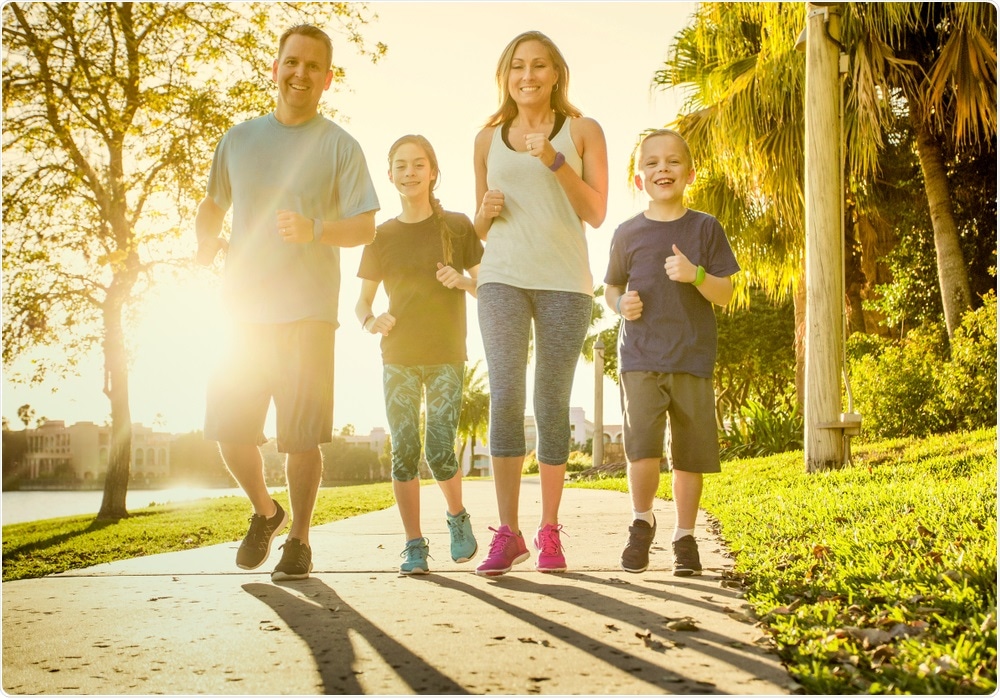The COVID-19 pandemic and subsequent social distancing, including complete isolation for some people, has caused a major change to people’s access to healthcare and daily living routines. This change has happened extremely rapidly.
Our research collaboration was concerned that health behaviors may have changed dramatically as a result – for example, people may be drinking more alcohol, or may not be eating such a nutritionally balanced diet.

Image Credit: Victoria 1/Shutterstock.com
We were aware of some emergent evidence that people may have become less physically active, but also possibly there might have been some positive health behavior change. Perhaps people have been more motivated to quit smoking, for example, or have been responding to accessing online exercise classes.
We felt it was extremely important to understand how people’s health behavior is changing in response to social lockdown, and the best way to do that is to ask people to give detailed feedback on their behavior over time.
Why do you believe it is important to track people’s health during a lockdown?
This is really an unprecedented situation for our generation – not since the second world war have UK residents had such restrictions imposed on daily living. The changes happened so quickly that no one was prepared to stop and think about what the long-term impact of these changes might be, beyond of course the obvious positive impact of helping to slow the spread of COVID-19.
Yet we think that changes to people’s health behavior and wellbeing may be quite profound, and even small changes can have long term health implications. For example, continuing to smoke, eating a nutritionally poor diet, and being physically inactive are all health behaviors that are directly linked to cancer risk later in life.
Understanding just how health behaviors have changed may enable us to understand what the implications might be long term.
In the short term, if we identify worrying trends in health behavior or significant changes within individuals, we hope to be able to quickly report findings to underpin changes in policy, perhaps through increasing support at a local level or targeting information or support to particularly vulnerable groups.
How can people maintain their physical and mental health during the COVID-19 lockdown?
Potentially one of the positive impacts of social lockdown is that there have been quite rapid changes to the availability of online and remote support options. For example, the NHS stop smoking service are offering remote appointments to help people trying to quit smoking.

Image Credit: brocreative/Shutterstock.com
There are excellent online resources for improving physical activity levels, for example, Joe Wicks has been providing the nation with free online PE lessons daily.
For mental wellbeing, people might be encouraged to join online social support groups and use social media or video conferencing facilities to stay in touch with family and loved ones that they cannot see face to face right now.
The survey will be looking at people’s behavior during the 2020 COVID-19 lockdown. How will you be recording this information and what factors will you be looking at?
People who consent to take part in the study will be asked to complete a short online survey initially. This is very simple to complete and should take no more than 15 minutes. Following this, people will be sent a text message reminder to their mobile phone every day for a period of 12 weeks.
This can be received at a specified time in the evening to suit people and will include a link taking them straight to an online survey.
The daily survey is extremely quick, taking around 3 minutes to complete, and will ask people about alcohol, smoking, any substance use, physical activity, and diet. The questionnaire is completely confidential and all participants will be anonymized in our reports of findings.
At the end of the study, we will offer to complete a brief personalized report that we can give back to people who have participated so that they can see the changes in their own behavior that have occurred over time.
We will invite a small number of people to take part in a more extended telephone interview after the 12 weeks of data collections are completed, so that we can better understand people's experiences of social lockdown.
What results are you hoping to see from the survey and how could these results be used to help people?
This study is unique in tracking health behavior on a daily basis at this unique moment in time, considering the context of the sweeping social changes that have occurred. The daily tracking approach will allow us to understand how individuals change their behavior over time, and how some people react differently to others.
We will also be able to compare between people, so might, for example, be able to understand how some groups of people respond differently to others. We will report our findings as quickly as we can, and throughout the study if possible, so that we can inform changes to policy and practice that might support people to behave in ways to maximize their own health.
Our findings will also enable us to better understand how people respond to the lockdown so that if we ever find ourselves as a society in this situation again, we will be better prepared to know how best to advise people so that they can respond in a way that protects their long term health.
Will some individuals’ health suffer more from lockdown than others?
Unfortunately, it is very likely that this will be the case. For our most vulnerable populations, those who have long term health conditions, those who are not financially stable, or those who do not have secure housing, for example, there is a concern that health and wellbeing outcomes may be worse.
Socially isolating when you do not have your own home or a family to care for you is a very different experience to socially isolating from a warm dry house, being able to afford to buy nutritious foods and being able to work from home.
People may respond differently to this very stressful situation – perhaps being more likely to misuse substances to deal with anxiety, or perhaps relapsing back to tobacco smoking as a way of coping with stress.
We just do not know for sure if these things are happening, although we think it might be likely – this study will provide us with the evidence to be able to understand for sure exactly how people are responding to social lockdown.
Do you believe the results from this survey could help inform future decisions and regulations during pandemics?
Absolutely. Without collecting data from people, we will only ever be able to hypothesize how health behavior has changed and the impact that may have had.
Collecting data from people on a daily basis during lockdown will give us robust evidence of any behavior change that occurs, both within and between individuals, over time. We will be able to track any changes against the changing social context as lockdown conditions change. This might inform future policymaking in preparation for pandemic situations.
How can people get involved in your COVID-19 lockdown research?
We really want to engage with people who are willing to provide daily updates. We especially want to hear from particularly isolated and vulnerable populations.

Image Credit: 13_Phunkod/Shutterstock.com
So, if you are the type of person that would not normally think about taking part in research – this study might be for you! It is so important we understand just how people’s health behavior is changing right now. To take part you can complete the baseline survey by clicking the link: https://survey.eu.qualtrics.com/jfe/form/SV_cMgh8ckcnwcnoMt
Following this, you will be sent a text message reminder to complete the short daily survey each evening.
What is the next step for your research?
The survey just opened today. We hope to recruit 500 people and will track them over the next 12 weeks. At the same time, we will track and monitor changes in the social context, as policy changes, and as the Government changes advice to the public on social isolation rules.
At the end of the 12 weeks, we will invite a smaller number of people to take part in a longer telephone interview so that they can tell us in more detail about how they have experience lockdown.
Where can readers find more information?
Anyone interested to find out more can visit our website: https://www.uea.ac.uk/medicine/research/addiction . We will post findings from the study on our website and provide links to any publications or reports.
To take part in the study you can access the first survey directly by following this link: https://survey.eu.qualtrics.com/jfe/form/SV_cMgh8ckcnwcnoMt
About Dr. Caitlin Notley
Caitlin is a Senior Lecturer in Mental Health at the Norwich Medical School, University of East Anglia, specializing in Addiction research. Her current research Programme, prior to the COVID-19 pandemic, focuses on smoking relapse prevention for women postpartum.
She is leading a research study to develop a smoke-free home intervention for families of babies admitted to neonatal intensive care units, and also have an active Programme of research exploring e-cigarette use for smoking cessation and relapse prevention.
She is a social scientist, interested in understanding health behaviors within different social contexts, and takes a particular interest in vulnerable populations and harm reduction approaches. She has expertise across quantitative and qualitative research methods.